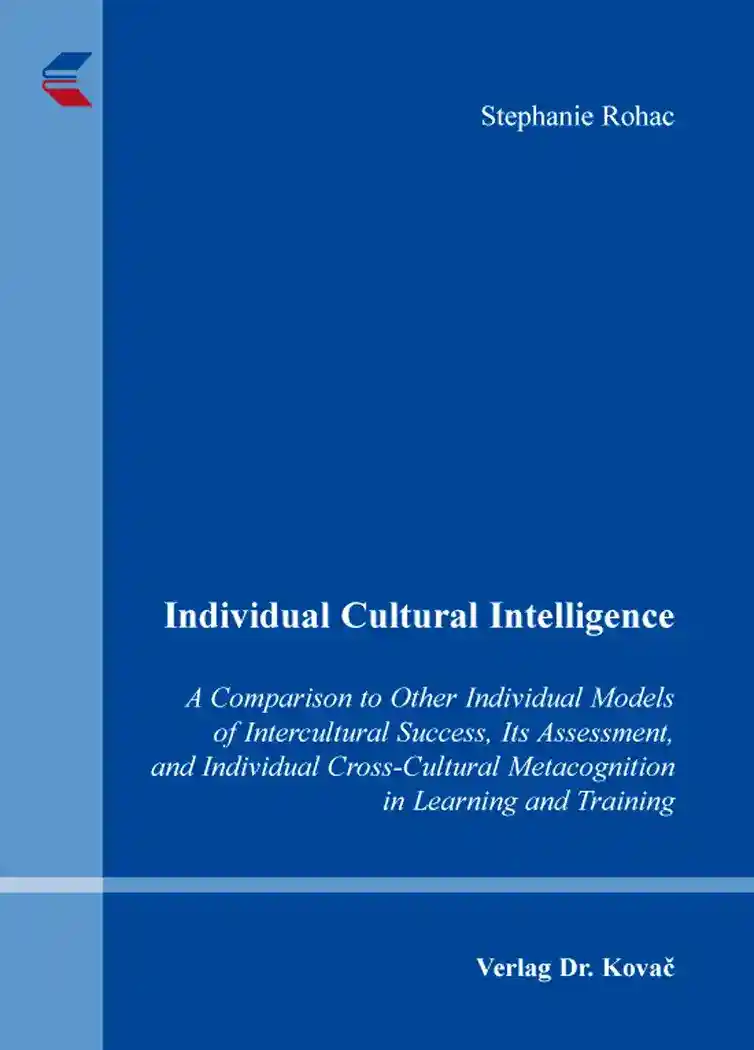Stephanie RohacIndividual Cultural Intelligence
A Comparison to Other Individual Models of Intercultural Success, Its Assessment, and Individual Cross-Cultural Metacognition in Learning and Training
COMMUNICATIO, Band 20
Hamburg 2014, 400 Seiten
ISBN 978-3-8300-8055-8 (Print)
ISBN 978-3-339-08055-4 (eBook)
Zum Inhalt
RELEVANCE
Organizational success in international business depends heavily on the individual’s ability to manage cross-cultural interaction. There is a growing organizational demand to assess and train individual’s cross-cultural flexibility and self-regulated learning ability in cross-cultural contexts. Individuals need to cope with unknown, unexpected, incomplete or unfamiliar information in cross -cultural interaction, with an increased level of cultural diversity, a decreased duration in one cultural context and a more frequent change of cultural contexts. Individuals are not able to develop adequate levels of culturespecific knowledge. Thus, there is an increased need to enhance the individual’s level of cross-cultural flexibility, not only for managers assigned to an international management task, but also for leaders directed to a culturally diverse team, and for employees working in a culturally diverse work environment or team.
MAJOR CONTRIBUTIONS
The major contributions of this dissertation refer to four distinct aspects: First, this dissertation is the first that systematically investigates a qualitative structural-dimensional comparison of individual cultural intelligence and other individual models of intercultural success. The comprehensive, cross-disciplinary structural-dimensional overview of existing individual models of intercultural success provides evidence for a great variety of individual models explaining intercultural success. The qualitative, structural-dimensional comparison reveals that the individual’s metacognition is insufficiently considered in other individual models of intercultural success.
Second, this dissertation describes and illustrates the scientific anchoring of the individual cultural intelligence model by developing a nomological network of relationships to personality traits and other types of intelligences, antecedents, distal factors, moderators, individual and interpersonal outcomes of individual cultural intelligence.
Third, this dissertation critically evaluates the existing self-report assessment instrument of individual cultural intelligence (CQS) and provides concrete solutions to develop or enrich the existing selfreport assessment instrument of individual cultural intelligence.
Fourth, this dissertation provides relevance for individual metacognition as self-regulated learning ability in cross-cultural contexts. Individual cross-cultural metacognition is suggested to facilitate the individual’s compensation of cognitive gaps, to foster the individual’s coping ability with the unfamiliar and unexpected, and to enhance the individual’s ability to transfer knowledge into strategy and vice versa. The individual model of cross-cultural metacognition integrates five dimensions with relevance to self-regulated learning in cross-cultural contexts.
OVERALL CONTRIBUTION
Individual’s meta-learning through processes of monitoring, awareness, reflection, planning and checking is supposed to enhance the individual’s ability of self-regulated problem-solving in an unfamiliar, complex and steadily changing cultural environment. Instead of focusing on linear, culture-specific rules of thumb, the individual’s cross-cultural metacognition is suggested to enhance the individual’s ability to cope with and learn from cross -cultural challenges with rising cultural complexity and diversity. Organizations operating in culturally diverse contexts ought to consider the rising importance of employee’s cross-cultural flexibility with regard to their human resource strategies. In particular, organizations are suggested to consider the rising importance of employee’s cross-cultural flexibility for their processes of selection, recruiting and training policies and practices.
Individual’s cross-cultural metacognition as gradual problem-solving ability is supposed to enhance the individual’s cross-cultural flexibility and is therefore suggested to be an increasingly relevant ability to succeed in cross-cultural contexts.
